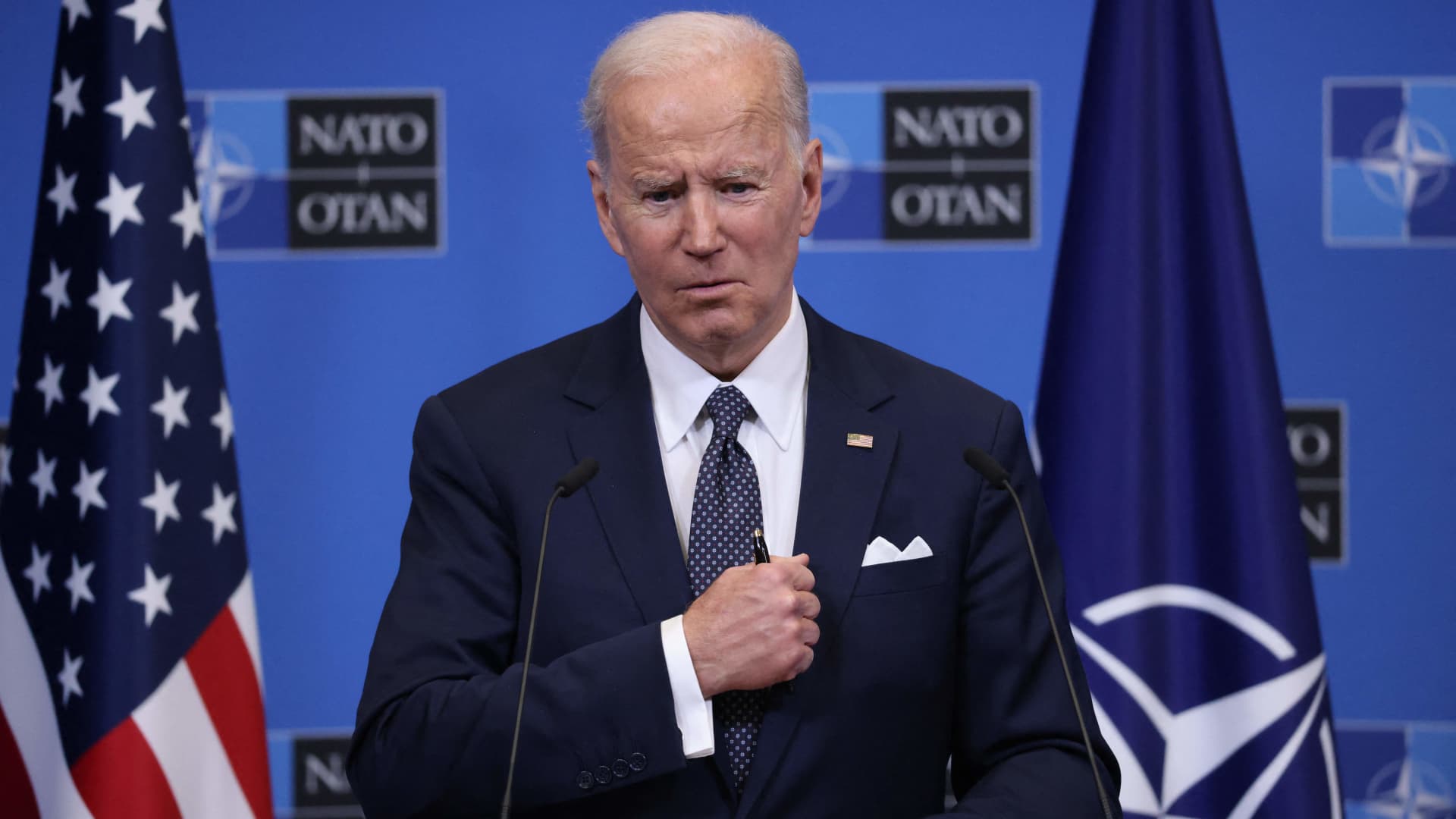
President Joe Biden said Thursday that NATO would respond “in kind” if Russia uses weapons of mass destruction in Ukraine.
“We will respond if he uses it,” Biden said, referring to Russian President Vladimir Putin. “The nature of the response depends on the nature of the use.”
The president spoke after a marathon of summit meetings with the European Union, G-7 partners and NATO allies.
Biden also said he would support an effort to expel Russia from the G-20 group of economies.
The president declined to say whether the United States has evidence that China has helped Russia evade sanctions or sold American high tech equipment to Russia in violation of export bans.
“I think that China understands that its economic futures much more closely tied to the West than it is to Russia,” said Biden. “And so I am hopeful that he does not get engaged,” Biden said, referring to Chinese President Xi Jinping.
Biden said NATO leaders discussed the need for NATO and the EU to set up a system to review any sanctions violations and “where, when and how” Russia is able to buy banned products.
On sanctions, Biden said the reason why he asked for the NATO meeting was “to be sure that after a month, we will sustain what we’re doing, not just next month, the following month, but for the remainder of this entire year. That’s what will stop (Putin).”
NATO Secretary-General Jens Stoltenberg, speaking to reporters from alliance headquarters in Brussels on Wednesday, said using chemical weapons would change the nature of the ongoing conflict in Ukraine.
“It will be a blatant violation of international law and with far-reaching consequences,” Stoltenberg said, adding that the use of such weapons could impact nearby NATO member countries.
The NATO alliance will be soon providing Ukraine with equipment to protect against chemical, biological, radiological as well as nuclear weapons, said Stoltenberg. He declined to elaborate on what kind of specific support the alliance would provide in order to protect operational security.
Russia has previously used chemical weapons on the battlefield, including in Syria, against Kremlin critic Alexei Navalny and against former Russian spy Sergei Skripal and his daughter Yulia in London.
Frustrated with his slow progress in Ukraine, Putin has been increasingly signaling the possibility of using chemical or biological weapons to wipe out entire cities and force the country to surrender.
Biden warned earlier this week that Putin was falsely accusing the U.S. and Ukraine of using biological or chemical weapons to possibly justify Russia’s own attack on Ukraine.
“Russia has a long track record of accusing others of what they are either already doing or about to do, and that is the kind of projection that we’ve seen in the last couple of weeks. And it’s very scary,” Biden said in an interview Tuesday.
Following the NATO meeting Biden said that U.S. allies had accomplished all three of his major goals in Brussels.
“First, to support Ukraine with military and humanitarian assistance. Second was to impose the most significant most significant economic sanctions regime ever, in order to cripple Putin’s economy and punish him for his actions. Third, was to fortify the eastern flank of our NATO allies who were obviously very, very concerned and somewhat worried what would happen,” said Biden.
Earlier in the day, the White House announced that the United States will sanction approximately 400 Russian individuals and entities, including more than 300 lawmakers from the Duma, the lower house of the Russian parliament, and Russian elites.
The G-7 and the EU also announced new measures to crack down on Russian efforts to evade current sanctions, including those on its central bank.
In addition to punitive measures against Russia, Biden announced several new efforts to assist Ukraine and countries dependent upon Ukraine’s grain harvest, which is in jeopardy as a result of the Russian invasion.
The U.S. “is prepared to commit more than $1 billion in humanitarian assistance to help get relief to millions of Ukrainians affected by the war in Ukraine,” said Biden.
“Many Ukrainian refugees will wish to stay in Europe, closer to their homes, but also will welcome 100,000 Ukrainians to the United States, with a focus on reuniting families. And we will invest $320 million dollars to bolster democratic resilience and defend human rights to Ukraine and neighboring countries,” Biden told reporters at a press conference following the meetings.
Through the U.S. government’s feed the future initiative, the Biden administration will provide $11 billion over the next five years to address threats to food security and prevent malnutrition.
The lion’s share of Ukraine’s grain exports currently go to Africa and Asia, and the American funds will be deployed to many of the countries where the population is especially vulnerable to a rise in food prices.




